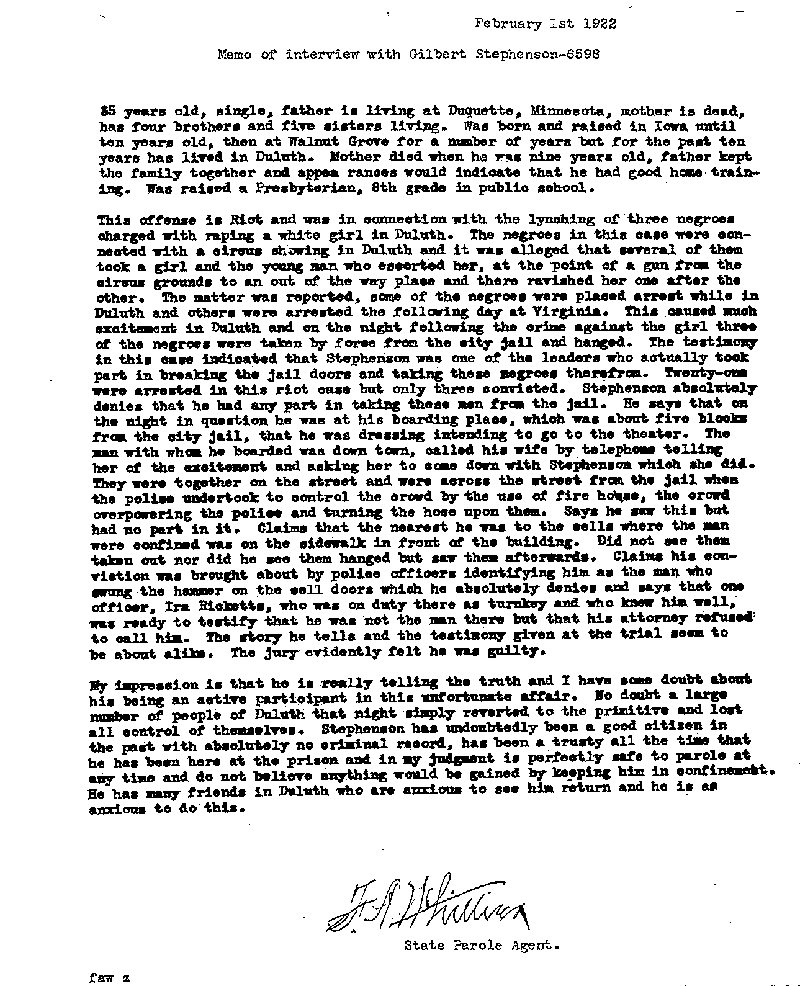Gilbert Henry Stephenson. Case No. 6598. Memo of Interview with Gilbert Henry Stephenson, February 1, 1922.
Images

Image text
February 1st 1922
Memo of interview with Gilbert Stephenson-6598
35 years old, single, father is living at Duquette, Minnesota, mother is
dead, has four brothers and five sisters living. Was born and raised in Iowa
until ten years old, then at Walnut Grove for a number of years but for the past
ten years has lived in Duluth. Mother died when he was nine years old, father
kept the family together and appearances would indicate that he had good home
training. Was raised Presbyterian, 8th grade in public
school.
This offense is Riot and was in connection with the lynching of
three negroes charged with raping a white girl in Duluth. The negroes in this
case were connected with a circus showing in Duluth and it was alleged that
several of them took a girl and the young man who escorted her, at the point of
a gun from the circus grounds to an out of the way place and there ravished her
one after the other. The matter was reported, some of the negroes were placed
arrest while in Duluth and others were arrested the following day at Virginia.
This caused much excitement in Duluth and on the night following the crime
against the girl three of the negroes were taken by force from the city jail and
hanged. The testimony in this case indicated that Stephenson was one of the
leaders who actually took part in breaking the jail doors and taking these
negroes therefrom. Twenty-one were arrested in this riot case but only three
convicted. Stephenson absolutely denies that he had any part in taking these men
from the jail. He says that on the night in question he was at his boarding
place, which was about five blocks from the city jail, that he was dressing
intending to go to the theater. The man with whom he boarded was down town,
called his wife by telephone telling here of the excitement and asking her to
come down with Stephenson which she did. They were together on the street and
were across the street from the jail when the police undertook to control the
crowd by the use of fire hose, the crowd overpowering the police and turning the
hose upon them. Says he saw this but had no part in it. Claims that the nearest
he was to the cells where the man were confined was on the sidewalk in front of
the building. Did not see them taken out nor did he see them hanged but say them
afterwards. Claims his conviction was brought about by police officers
identifying him as the man who swung the hammer on the cell doors which he
absolutely denies and says that one officer, Ira Ricketts, who was on duty there
as turnkey and who knew him well, was ready to testify that he was not the man
there but that his attorney refused to call him. The story he tells and the
testimony given at the trial seem to be about alike. The jury evidently felt he
was guilty.
My impression is that he is really telling the truth and I
have some doubt about his being an active participant in this unfortunate
affair. No doubt a large number of people of Duluth that night simply reverted
to the primitive and lost all control of themselves. Stephenson has undoubtedly
been a good citizen in the past with absolutely no criminal record, has been a
trusty all the time that he has been here at the prison and in my judgment is
perfectly safe to parole at any time and do not believe anything would be gained
by keeping him in confinement. He has many friends in Duluth who are anxious to
see him return and he is as anxious to do this.
F. A.
Whittier
faw z State Parole Agent.

